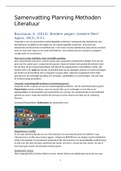Investments
1|Page
, Created by Maxime Dedeyne
Contents
The investment environment ................................................................................................................. 4
Real assets versus Financial assets ..................................................................................................... 4
Financial Assets ................................................................................................................................... 4
Financial Markets and the Economy ................................................................................................... 4
Market are Competitive ...................................................................................................................... 5
The players .......................................................................................................................................... 5
Extra .................................................................................................................................................... 5
Asset class and financial instruments ..................................................................................................... 6
The money market .............................................................................................................................. 6
The bond market................................................................................................................................. 7
Equity securities .................................................................................................................................. 7
Stock and bond market indexes.......................................................................................................... 8
Derivative markets .............................................................................................................................. 8
How Securities are traded..................................................................................................................... 10
How firms issue securities................................................................................................................. 10
How securities are traded ................................................................................................................. 10
The rise of electronic trading ............................................................................................................ 11
U.S. markets ...................................................................................................................................... 11
New trading strategies ...................................................................................................................... 12
Globalization of stock markets ......................................................................................................... 12
Trading costs ..................................................................................................................................... 12
Buying on Margin .............................................................................................................................. 12
Short Sales......................................................................................................................................... 13
Risk, return, and the historical record .................................................................................................. 14
Determinants of the level of interest rates ...................................................................................... 14
Comparing rates of return for different holding periods ................................................................. 15
Bills and inflation, 1926-2015 ........................................................................................................... 16
Risk and risk premiums ..................................................................................................................... 16
Times series analysis of past rates of return .................................................................................... 17
The Nominal Distribution .................................................................................................................. 18
Deviations from normality and alternative risk measures ............................................................... 19
Historic returns on risky portfolios ................................................................................................... 20
Normality and long-term investments.............................................................................................. 20
Capital Allocation to risky assets........................................................................................................... 21
Risk, Speculation, and Gambling ....................................................................................................... 21
2|Page
, Created by Maxime Dedeyne
Risk aversion and utility values ......................................................................................................... 21
Capital allocation across risky an risk-free portfolios ....................................................................... 21
The risk-free asset ............................................................................................................................. 22
Portfolio of one risky asset and a risk-free asset .............................................................................. 23
Risk tolerance and asset allocation................................................................................................... 23
Passive strategies: the capital market line........................................................................................ 24
Optimal risky portfolios ........................................................................................................................ 25
Diversification and portfolio risk....................................................................................................... 25
Portfolios of 2 risky assets ................................................................................................................ 25
Asset allocation with stocks, bonds, and bills ................................................................................... 26
The Markowitz Portfolio Optimization Model .................................................................................. 27
Risk Pooling, Risk Sharing and the Risk of Long-term investments .................................................. 28
Index Models......................................................................................................................................... 29
A single-factor security market ......................................................................................................... 29
The single-index Model ..................................................................................................................... 29
Estimating the single index model .................................................................................................... 32
The Industry version of the index model .......................................................................................... 32
Portfolio construction using the single index model ........................................................................ 33
3|Page
, Created by Maxime Dedeyne
The investment environment
Real assets versus Financial assets
Real Assets: land, buildings, machines, ... <-> Financial assets: they do not contribute directly to the
productivity capacity of the economy. They are claims to the income generated by real assets.
Successes or failure of the financial assets we choose to purchase ultimately depend on the
performance of the underlying real assets.
Financial Assets
3 broad types of financial assets:
Fixed income (debt securities) promise either a fixed stream of income or a stream of
income determined by a specified formula.
Equity
Derivatives such as options and future contracts provide payoffs that are determined by the
prices of other assets such as bond or stock prices.
2 types of markets:
Money market: refers to debt securities that are short term, highly marketable, and generally of
very low risk, e.g. U.S. Treasury bills.
Capital Market: includes long term securities such as Treasury bonds, which range from very
safe to relatively risky.
Financial Markets and the Economy
Informational role of the financial market
Stock prices play a major role in the allocation of capital in market economies, directing capital to
the firm and applications with the greatest perceived potential.
Consumption timing
One way is to “store” your wealth in financial assets. In high-earnings periods, you can invest your
savings in financial assets such as stocks and bonds. In low-earnings period, you can sell these assets
to provide funds for your consumption needs.
Separation of ownership and management
Agency problem: managers who are hired as agents of the shareholders, may pursue their own
interests instead, instead of the company’s interest.
Active investors: are large and deep-pocketed investors, often hedge funds, that identify firms they
believe to be mismanaged in some respect (Carl Icahn, William Ackman, Pershing Square, Nelson
Peltz, ...)
Corporate governance and Corporate Ethics
Investors make 2 types of decisions in construction their portfolios.
1. The asset allocation decision: is the choice among the broad asset classes.
2. The security selection decision: is the choice of which particular securities to hold within
each asset class.
4|Page



